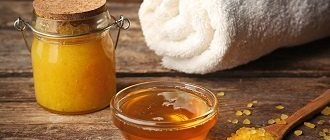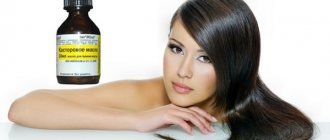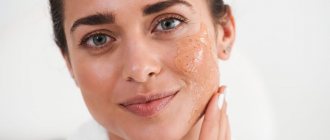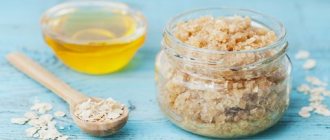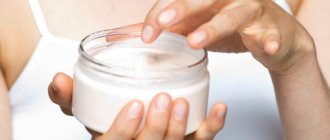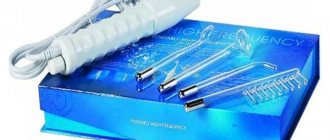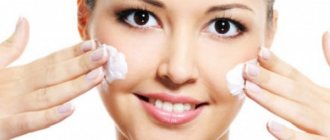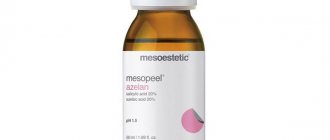Foams, gels, mousses - every day girls use various products to style and easily comb their hair. But no matter how thoroughly you wash your hair after using them, an invisible silicone film still remains on the skin. Because of this, hair can be excessively greasy at the roots and dry at the ends.
All the hair products that we use contaminate the roots and clog the pores of the scalp, as a result of which the hair does not receive enough oxygen and nutrition. The scalp accumulates all the product residues that are applied to the hair and are not always removed properly. When hair doesn't breathe, it begins to fall out. That's why it's so important to take care of your scalp, using special products to deeply cleanse pores and get rid of dead scales. One of these products is a natural salt scrub, which you can make yourself.
Exfoliation is a cosmetic procedure that should be part of every woman's skincare regimen. With its help, dead cells are removed and regeneration occurs, improving the effect of using aesthetic products and masks.
In addition, hair dryers or changes in weather conditions have a negative impact on the condition of the hair, increasing sensitivity and leading to problems such as dryness. The procedure is highly recommended for people with oily scalp.
People suffering from dandruff and dry skin will find benefits in this practice. If you use hair dye frequently, you can also use scrubs to remove dye residue and improve the appearance. Masks and peelings are simple to prepare and suitable for women and men of various age categories.
Benefits for skin and hair
Salt is an effective and common component in various cosmetics. Using a salt-based scrub has a lot of beneficial effects:
- deep cleansing of the epithelium from mechanical and organic contaminants;
- exfoliation of dead skin particles;
- stimulation of local blood supply improves nutrition and oxygenation of skin cells and hair follicles;
- improved curl growth;
- stabilization of the sebaceous glands;
- prevention and elimination of dandruff and seborrhea;
- improvement of the skin - elimination of itching, inflammation.
Another excellent property of salt peeling is the preparation of the hair and scalp for the effects of other care products: masks, wraps, elixirs and serums.
Who shouldn't do it?
But in the following cases, scrubs with added salt can cause significant harm, so avoid them if:
- you have wounds, scratches and other damage to the scalp - it will be very unpleasant;
- you have severe baldness - weak follicles will not be able to hold thin hair due to mechanical stress;
- you are allergic to salt in general - it happens, but quite rarely;
- hair is overdried, split in length - salt will only aggravate the problem, remember how long it takes to restore hair after swimming in the sea;
- you have increased sensitivity of the scalp - in this case, unwanted irritation may occur; it is better to replace it with another component.
That's all! I advise you not to forget to deep cleanse your scalp with scrubs. If you have never tried it before, do it and you will immediately feel the difference before and after. Trichologists also recommend hair scrubs; they will be especially beneficial for oily scalps.
Have healthy hair! See you!
Indications for use
A salt scrub effectively copes with various cosmetic problems that arise with the hair and scalp. This product is recommended for oily, normal hair ; it can also be used for dry and fine hair, taking precautions.
Salt scrubbing should be included in the complex of procedures if the following problems arise:
- excessive activity of the sebaceous glands;
- the appearance of dandruff;
- mechanical contamination of the head;
- lack of shine and slow hair growth.
What to choose – sea or cook?
Although table salt, which is available in every home, can be used to prepare a scrub, the use of sea salt is much more effective. This type of this essential substance contains many useful mineral impurities that are necessary for the health of hair and epithelium - micro- and macroelements: potassium, magnesium, iodine, manganese, iron, selenium, copper.
Do not use salt with large crystals - these particles can injure the delicate scalp and damage the hair structure. Crushed “Extra” salt is also not suitable for the procedure - its crystals immediately dissolve in water and other substances.
Important! Maintaining the mineral balance in the cells of the hair follicles ensures their development. The skin of the scalp usually does not receive sufficient nutrition due to its location. The use of mechanical peeling based on sea salt restores all the vital functions of the cells of the scalp and hair.
When not to do the procedure
Homemade peeling hair cleansing using sea or iodized salt is more gentle than salon procedures. The product, prepared in the kitchen, does not contain aggressive elements that penetrate deep into the epidermal layer. But just like any other cosmetic procedure, salt peeling is distinguished by its list of contraindications:
- for those with dry hair and increased flaking of the scalp, it is better to avoid it;
- scrubbing with sea salt does not imply daily use - peeling is repeated maximum once every 14 days;
- unhealed wounds, fresh scratches, microcracks, abrasions and burns are also on the list of contraindications for sessions;
- increased sensitivity of the epidermis and a tendency to allergies prohibit salt peeling;
- peeling cannot be performed during the period of infection of the scalp, manifestations of dermatological diseases or purulent inflammatory processes on it;
- this type of peeling is prohibited in the presence of tumor growths in the salt treatment area;
- during periods of heavy hair loss (for example, during breastfeeding), a salt scrub can aggravate the situation;
- It is not recommended to perform the peeling procedure within a week after perm, lamination, keratin straightening or hair lightening;
- Immediately after salt cleansing, you should not apply warming masks to your hair, for example, with mustard or nettle.
Itching and burning during a sea salt peeling session is a signal to stop it immediately. In the future, the discomfort will not disappear, and peeling will provoke the appearance of extensive redness on the skin.
How to do it at home?
The simplicity of this product allows you to use it at home and get the effect of a salon treatment. Scrubbing is performed before washing your hair.
Step by step instructions:
- 2-3 tbsp. l. If necessary, the salts are crushed in a mortar or using a blender.
- The entire length of hair must be thoroughly combed, moistened and parted.
- The salt must be slightly moistened in your hands, immediately before application, until a thick paste forms.
- Apply the scrub along the parting and gently massage your head in a circular motion for 4-5 minutes.
- After the massage, leave the composition for another minute, then rinse with water, thoroughly washing the roots.
- Wash your hair with shampoo and use a mask, balm or conditioner.
The procedure must be repeated no more than once a week.
Recommendations for a beginner
The positive effect of using salt hair peeling will come to naught if the product is used incorrectly. And not a single expectation will be met if you miss important nuances of the procedure. Especially when doing it for the first time. After all, despite its familiarity, salt is an aggressive substance that requires careful handling and measures.
- Salt peels for the scalp require moisturizing or nourishing the hair with special cosmetics. At the same time, apply the composition so that it does not come into contact with the skin itself;
- At the end of the peeling procedure, refrain from quickly drying the strands with a hairdryer, and do not rub them too vigorously with a towel. Leave enough time and let the curls dry on their own;
- Massaging the scalp too actively with a composition containing salt crystals and rubbing it in can cause hair breakage;
- When preparing the peeling composition, observe the following salt proportions: 1-2 tablespoons of salt are enough for short hair, 4-5 for medium hair, and maximum 6 for long hair. Try not to exceed the concentration;
- Apply the peeling mixture along the partings in your hair.
Hair peeling using sea or iodized salt is far from pampering and a very useful waste of time. It can become a preparatory stage for other caring and therapeutic procedures. For example, restoring hair health at the cellular level or drug therapy for the scalp. After such peeling, all products will be better absorbed and, accordingly, have a noticeable and quick effect.
What can you add to salt peeling?
You can enhance the beneficial effect of the procedure by including active ingredients in the composition, which will also benefit the hair and skin:
Olive oil in the scalp scrub deeply nourishes and moisturizes them from the inside. Vitamins and fatty acids contained in the oil soften the effect of the scrub.- Burdock oil ensures growth and nutrition of deep hair structures, and also stimulates the development of new hair follicles.
- Blue, white and black clay have an additional cleansing effect on excessively oily hair, making it manageable and maintaining freshness for a long time.
- Aloe juice has a powerful antioxidant effect, nourishes with vitamins and microelements.
- Essential oils of rose, orange, rosemary, tea tree, bergamot, ylang-ylang, lavender, mint, eucalyptus, pine contain vitamins and microelements that are beneficial to the condition of curls.
- Decoctions of herbs such as nettle, chamomile, lovage, birch buds, hops, burdock root, calendula, and laurel can be used in hair scrubs, increasing the effectiveness of the procedure.
Professional products
The use of natural salt in professional hair scrubs is quite common. Salt, as a natural abrasive, is found in many products. A few examples:
- Christophe Robin “Cleansing scrub with sea-salt” . A high concentration of sea salt combined with a gentle effect on the skin ensures the effectiveness of the product. A scrub from a renowned colorist restores blood microcirculation, eliminates impurities and maintains the natural water balance in the skin.
Adama Deep Cleansing Scalp & Hair Scrub With Sea Salt from Zion Health Inc. The organic deep cleansing product has a rich composition: biotin, almond and olive oils, sea salt, aloe extract. Thanks to its active ingredients, this product delicately and deeply cleanses and nourishes the upper layers of the scalp, without negatively affecting the hair structure.- Zeytun “Scrub-mask for scalp and hair Detox with Dead Sea salt and lavender essential oil . The content of shea butter and lavender essential oil makes the scrubbing procedure as delicate and effective as possible. The product has a calming and anti-inflammatory effect, excellent for the treatment of dandruff and seborrhea.
Sea salt scalp scrub
A sea salt scalp scrub is an excellent remedy to prevent most scalp problems. Many women use this scrub to get rid of dandruff, hair loss, etc.
To stimulate hair growth and correct some scalp problems using expensive cosmetics, remember that this is not the only way. Sea salt or even table salt can combat hair loss, itching and acne. Such a simple, cheap and effective hair care ingredient is available in any store and has a low price.
Sea salt scalp scrub, prepared at home, is a popular cosmetic procedure and occupies a leading position. This gift of nature is useful for baths and for weight loss, as a component of various scrubs and masks. But let's talk about sodium chloride and the scalp scrubs and shampoos we can make with it.
Starting with the positive properties of salt crystals, which are a good ingredient in a scalp scrub. Imagine tiny isometric white particles moving across the surface of the skin under your fingers and removing dead skin cells and sebum, like sandpaper on metal. Simple shampoo and any other commercial cleanser cannot clean your scalp as well as a salt scrub.
Removing dead skin cells is important in some cases because every part of the skin on our body needs exfoliation (the process of removing dead cells on the outermost surface of the skin). A scrub can gently perform this mechanical work, in addition, it can be extremely moisturizing and pleasant to the skin.
Our cosmetics market is oversaturated with a huge number of different exfoliating masks and scalp scrubs, but you can prepare such products at home with your own hands using natural ingredients.
Which salt to choose for scrub
So, first, let's look at a few questions that interest most women. What is the difference between different types of salt? Which one is the most suitable for treating hair or other beauty products, table or sea salt, kosher or Himalayan hair salt?
In general, all types of salt contain sodium chloride (NaCl) and the same mixture of other elements. The combination of impurities, their quantity, or simply purity is the key to the salt difference. There are four main types of salt:
- rock salt from salt quarries;
- extracted salt from saline solutions;
- sea salt (the healthiest salt from the Dead Sea);
- sedimentary, rock salt (from the bottom of lakes with high salinity).
Himalayan salt (rock salt) – has 85% sodium chloride and the remainder contains over 80 minerals. These minerals help balance the body's pH level, regulate water content, remove toxins, help absorb nutrients, prevent muscle spasms, etc.
Kosher salt is like regular table salt, obtained through a special evaporation process. Typically does not contain any additives such as NaCl. It is characterized by its grain size, usually coarser than table salt. The shape of the crystals is different, not cubes, but flat or pyramidal granules.
Sea salt – basically only has sodium chloride, however, depending on where it was collected and how it was processed, it usually contains some trace minerals such as potassium, iron and zinc. The darker the sea salt, the higher its concentration of impurities and trace elements.
Celtic salt (as a variant of sea salt) – this contains some minerals and much less sodium than regular table salt. It has a grayish color and also contains some water, making it quite moist. This salt has all 82 minerals that the human body needs for optimal health and longevity. Table or Kosher salt is noticeably inferior to Celtic salt in possible health benefits.
Iodized salt – suitable for rapid hair growth. Iodine is a wonderful, natural, relatively inexpensive product for restoring hair growth and improving scalp tissue. This element is part of the thyroid hormones (a combination of iodine, selenium and the amino acid tyrosine), which are the main cause of hair loss in both men and women.
Many people need not only selenium or tyrosine, but also iodine, which most people are deficient in. Iodine deficiency is characterized by symptoms such as dry skin, cold hands and feet, fatigue, weight gain and depression. Therefore, it is necessary to take iodized table salt in food.
In addition to iodine, table salt may contain various artificial substances that are added to the salt so that it does not cake or stick together. In addition, sodium aluminosilicate E554, sodium, potassium, calcium ferrocyanide (E535, E536, E538) and others can be added to the salt. Most often E554 is added, so if you have liver or kidney disease. Therefore, carefully look at the contents of the package before purchasing. It is necessary to use pure iodized salt without any foreign impurities or artificial additives.
Without a doubt, we can use any salt because the main active substance for our purpose is NaCl, and the concentration of sodium chloride is almost the same for all salts. However, for the treatment of alopecia (baldness) and hair growth, iodized table salt or sea salt is used.
Why is sea salt so good for hair?
Reviews from many people indicate that the use of salt in hair treatment leads to excellent results due to the revitalization of follicles and increased blood circulation in the scalp. People also notice faster hair growth, increasing overall hair health improvements.
In general, sea salt is known for its healing properties. For example, in ancient times, Japanese women (especially geishas) included salt in their daily skin care routine as an anti-cellulite annihilator. It has also been shown to reduce microbial contamination in the upper respiratory tract and detoxify the therapeutic effects of salt on the human body.
So if you compare sea salt and table salt, remember that they have the same amount of sodium chloride, but only sea salt retains all the trace minerals found in salt water, but table salt is also processed to remove trace minerals and includes additives.
For cosmetic purposes, sedimentary salt is more valuable than others because its composition is enriched with minerals. In addition, it contains sodium iodides, carbonates, fluorides and other chemical compounds. But to strengthen the hair follicle and intensively nourish the scalp, various sea salts (for example, Celtic or Dead Sea salt) are also preferable.
Benefits of sea salt for hair and scalp
Salt peeling is one of the possible procedures that will help get rid of a variety of scalp and hair problems. Regular use of sea salt helps remove sebum well, improves blood circulation and accelerates hair growth. The study showed the specific benefits of each salt component. The main benefits of sea salt for hair and scalp are:
Calcium – soothes skin cells, which is very necessary in strengthening cell membranes and cleanses pores.
Magnesium – accelerates cell metabolism, acts as an antiallergic agent.
Bromide – heals and relieves disorders, has a relaxing effect as an anti-inflammatory agent, can be used as a natural antibiotic.
Sodium chloride – nourishes and moisturizes skin cells and removes toxic waste, improving skin permeability.
Zinc – natural regulation of cell growth and regeneration. Promotes cell renewal and stimulates the synthesis of collagen and elastin (renews the skin). Contains antioxidants that fight free radicals. Zinc also improves anti-inflammatory properties and is a natural UV blocker.
Sulfur is effective to help relieve symptoms of skin conditions such as psoriasis, seborrhea and eczema.
Contraindications when using sea salt for the scalp
Do not use salt if you have any skin damage such as scratches or wounds. This procedure can lead to excessive irritation, pain and burning.
Never apply salt to dry hair as this can damage your hair and cause more breakage and hair loss.
If you have oily hair, you can use a salt mask twice a week, and if you have dry hair, then use a sea salt hair scrub once every ten days. For normal hair care, using sea salt once a week will be enough.
A salt scrub for the scalp can help fight against severe hair loss (baldness) and seborrhea. It can increase blood circulation, improve cellular metabolism and promote better penetration of nutrients (hair masks, serums, vitamin and mineral complexes) that are applied to the scalp after peeling.
Sea salt for scalp acne
Acne on the scalp is not only a medical problem, but also a cosmetic problem. This phenomenon makes it difficult to care for your hair, since you can injure your scalp with a comb when combing your hair, causing painful pimples on the scalp. Also, with acne, itching is often disturbing and seriously spoils the appearance, causing psychological discomfort (even mood swings and depression).
Sea salt is considered a fairly common way to treat scalp acne. It is a known fact that sea salt has high sulfur content, which is a powerful cleanser for effectively removing blackheads from the scalp. Sea salt can effectively cleanse skin oils that clog pores.
Note: Never squeeze pimples on your scalp! This can lead to infection and further spread of the rash, causing more itching, pain and burning.
You can easily prepare a salt scrub to remove scalp acne.
Mix 1 tablespoon sea salt with 1 teaspoon hot water (make sure the salt doesn't dissolve). You can also add 1 teaspoon of honey to provide extra moisture to your scalp and mix all the ingredients well.
If you're ready to use a sea salt scrub on your scalp, wet your hair roots first. Then use your fingertips to rub the mixture very gently, avoiding damaging the pimples. Leave the scrub on the scalp for 5 minutes, then rinse it off with warm water. If you get irritated, stop using the scrub and rinse with warm water.
How often can you use sea salt for scalp acne?
Sea salt can dry out the skin, so too frequent use is not recommended. If you want to treat scalp acne without making the situation worse, it is recommended to use sea salt once a week.
If you experience a lot of discomfort, itching, pain or burning while using sea salt scrub and you cannot determine the cause, then you should visit a dermatologist to determine the cause to stop the spread of scalp acne. Don't forget that acne can only be a symptom of some serious health problems, and the sooner you start treatment, the better.
Recipes for sea salt scrubs and masks for scalp
So, let's look at some excellent recipes for sea salt masks and scrubs for the scalp, which can easily be prepared at home. These scrubs and masks are suitable for various types of scalp and solve many problems.
Sea salt scrub with olive oil to moisturize the scalp
You will need:
2 tablespoons sea salt
2 tablespoons olive oil
3 – 4 drops essential oil (preferably lavender, peppermint or tea tree oil)
First, you must mix the ingredients well. Then gently apply the scrub to your scalp and massage for 3 to 5 minutes (it's best to do this before you shampoo your hair). When rubbing the scrub into the skin, do not press hard on the scalp, as this may cause scratches on the scalp. After this, you can wash your hair as usual. Apply this homemade scalp scrub once a week.
A wonderful blend of special essential oils, salt and some carrier oils will have a beneficial effect on dry scalps. The use of such a scrub will improve the condition of the hair, which will lead to intense blood flow to the hair follicles and will contribute to the health of the scalp through its antifungal and anti-inflammatory effects.
Olive oil is useful for saturating dry scalp with moisture. Tea tree oil can be used on oily or dry hair as it can help treat psoriasis and dermatitis because it has antiseptic and antifungal properties. Lavender oil is also beneficial for dry and oily hair, it can help remove blackheads and seborrhea, and lavender oil is also beneficial for scalps with ulcers. Chamomile oil has beneficial anti-inflammatory qualities.
Note: Do not use a salt scrub all over your hair as it can make your hair dry. Apply the scrub directly to the scalp. It is not recommended to use a salt scrub if you have minor skin irritation (otherwise it may make the situation worse).
If you regularly use a scalp scrub, you will forget what dandruff is. Moreover, your hair will grow faster. After using a salt scrub, it is recommended to use homemade hair masks, as their components easily penetrate the scalp.
Dead Sea Salt Scalp Mask to Prevent Alopecia and Improve Hair Strength
A mask with sea salt, especially with Dead Sea salt, penetrates deeply into the hair structure, strengthens and heals its roots, restoring vitality to the hair and preventing hair loss.
Organic additives such as citric acid and vegetable glycerin stimulate hair follicles and restore the keratin layer, preventing breakage and balding. Hair elasticity is achieved through the inclusion of various vitamins, which also nourish the entire scalp
Scalp mask with Dead Sea salt recipe No. 1
You will need:
0.5 cups of water enriched with Dead Sea salt
1 teaspoon vegetable glycerin
1 teaspoon rosehip oil
1 teaspoon apricot kernel oil
0.5 teaspoon vitamin A
Mix all the ingredients and apply to the scalp, leave for 15 - 20 minutes and rinse with warm water using organic shampoo.
Scalp mask with Dead Sea salt recipe No. 2
You will need:
0.5 cups of water enriched with Dead Sea salt
1 teaspoon vegetable glycerin
5 – 6 drops essential oils (orange, lemon or ylang ylang)
0.5 teaspoon vitamin E and B5
0.5 – 1 teaspoon lemon juice
Mix all the ingredients and apply to the scalp, leave for 15 - 20 minutes and rinse with warm water using organic shampoo.
Anti-dandruff sea salt scrub-mask with kefir for different hair types
You will need:
1 cup (about 200ml) low-fat yogurt for oily hair
1 cup (about 200 ml), 1% fat or more kefir, or yogurt for dry hair
1 yolk
2 tablespoons sea salt
1 teaspoon castor oil
First of all, warm up the kefir or yogurt a little to better dissolve the salt. Add chicken yolk, two tablespoons of salt and castor oil. Mix the ingredients with a non-metallic spoon to avoid oxidation and rub thoroughly into the hair roots. Put on a shower cap to prevent the mixture from dripping onto your forehead and leave for 30 minutes. Rinse with a mild organic shampoo under running water. Hair loss treatment with salts is designed to boost activity with a variety of nutrients. For example, yogurt helps mitigate the drying effects of salt.
Sea salt scrub mask with wheat germ oil
You will need:
2 tablespoons salt
1 cup (about 250 ml) pure distilled water
1 tablespoon wheat germ oil
1 tablespoon almond oil
In a glass of mineral water, mix a teaspoon of almond oil and a teaspoon of wheat germ oil, add two tablespoons of salt. The resulting mixture should be applied to the scalp, avoiding contact with the entire length of the hair. Cover with a plastic bag and leave on for 10 minutes before rinsing with an organic shampoo. If your hair remains oily, wash your hair twice.
Sea salt mask to strengthen and increase hair growth
You will need:
1 tablespoon organic honey
2 tablespoons sea salt
2 tablespoons cognac
1 teaspoon vegetable glycerin optional
Mix all components thoroughly, dissolve the salt completely. If the mask is still too watery, add more honey or glycerin. Then apply the mixture to your scalp, cover your head with a plastic bag and wrap it in a terry towel. Leave the mask on for 10 – 15 minutes and rinse off the mixture with warm water and, if necessary, a mild shampoo.
Regenerating salt mask-scrub with honey and mustard
You will need:
1 tablespoon organic honey
1 tablespoon sea salt
1 egg yolk
1 tablespoon mustard powder
5 ml macadamia or avocado oil (can be replaced with olive oil)
2 – 3 teaspoons lemon juice
Mix all the ingredients listed above well until you get a smooth paste. After this, gently rub into the scalp, avoiding contact with the entire surface of the hair. Wear a shower cap and wrap a towel around your head to improve blood circulation. Leave the mask on for 20 minutes and then wash it off with shampoo. This hair mask works great to strengthen strands and enrich them with all the necessary nutrients.
To summarize, let's check in detail each component that we use in the above recipes.
Dead sea salt or other salt – essential for cleansing the scalp, salt improves the ability of hair follicles for better hair growth. Which in turn helps reduce hair loss. Salt with microelements helps in restoring the skin and gives it a smoother and healthier appearance. Sea salt contains minerals like sulfur, which is great for the skin and makes it healthy from the inside out. Its high bromide and magnesium content makes it useful for treating various types of allergies. It also helps cleanse and detoxify the skin, leaving it beautiful and youthful. Magnesium is important for combating stress and fluid retention, slowing skin aging and calming the nervous system. Potassium fuels the body, helps balance skin moisture, and is an important mineral to replenish after intense exercise.
Vegetable glycerin is hygroscopic in nature, which means it absorbs water from the environment and releases it back into the dry hair structure or scalp. Vegetable glycerin is obtained from palm or coconut oil and is good for restoring moisture to dry, frizzy or brittle hair. This is especially useful for unruly or dry hair, as well as layered hair. Apart from its moisturizing benefits, it also greatly helps strengthen hair by reducing hair breakage and eliminating split ends.
Panthenol (Vitamin B5) – non-toxic, non-irritating vitamin B5, is a herbal ingredient. In addition, it is also a hair thickener and enhances hair growth, gives thickness and density to the hair, and nourishes and moisturizes the scalp.
Tocopherol (Vitamin E) – protects hair and skin from damage caused by UV, as a result of which the color of dyed hair is not washed away and prevents split ends and hair breakage.
Citric acid is a natural extract derived from citrus fruits and is a common organic acid used in the cosmetic and food industries as a preservative and pH-balancing agent for the skin. Citric acid has antioxidant properties and is also used to stabilize masks and scrubs.
Basic tips and tricks for treating the scalp with sea salt
All scrubs and hair masks with sea salt should be applied to damp hair after shampooing. This procedure is also possible before washing your hair, but the hair must first be wet for better distribution of the mass.
After spreading the saline solution through your hair, put on a shower cap to ensure better blood circulation and better penetration of nutrients to your scalp.
When washing your hair, it is recommended to use a loreth sulfate-free shampoo or use an organic shampoo to avoid any negative effects on your hair.
There are certain guidelines to follow for a specific hair type. For example, a salt treatment for dry hair should be done once a week, while an oily or normal hair type may require a salt treatment twice a week.
Procedures for strengthening hair include 6 – 7 courses, which are accompanied by a three-month break.
If you feel that your hair has become drier after using a sea salt scrub or mask, then this is not a big problem. First, you need to get good moisture for your hair. After you've shampooed and towel-dried your hair, apply 4-5 drops of jojoba oil to your hair, focusing more on the ends. Then put on a shower cap, wrap your hair in a towel and leave for 1 or 2 hours. You can even use a hair dryer during this process, as the heat will help open up the hair cuticle to allow the jojoba oil to penetrate the hair better. After this, rinse your hair with cool water. This will help close the cuticle and lock in moisture.
Did you know that sea salt can be used to make shampoo? If you want to treat yourself to homemade salty hair shampoo, then read my post: Sea Salt Shampoo
Sea salt for scalp, reviews
Ira, 20 years old
I haven't tested masks, but I have rinsed my curly hair frequently with salt water. I noticed that my hair has become thicker, but there is no strengthening yet.
Angela, 27 years old
I've tried masks with yogurt and dead sea salt and I like them. The scrub effectively removes dandruff; literally after the second use, the white flakes almost disappeared. And I recommend everyone to try all the masks and decide what suits you best.
Mila, 21 years old
I love my homemade sea salt scrub! It has perfect deep cleansing properties. My scalp felt so fresh and clean! I use it once a week because it can dry out my hair. I recommend this salt scrub for those who have oily scalp because it can solve this problem very well.
Lena, 30 years old
I use the salt mixture on my scalp only when it becomes itchy and oily. Because salt can make my curly hair dry, so I avoid using it too often. Typically, I condition my hair and then apply a scrub to my scalp. I like! I suffered from dandruff for many years, but since I started using a salt scrub, it has helped reduce the appearance of it. I even feel like my hair is growing much faster!
Contraindications
These scrub compositions have virtually no contraindications. The only exception is individual intolerance to the components.
When using salt scrubs, you need to “listen” to the sensations - if a burning sensation or pain occurs, the procedure must be stopped. These symptoms can appear with unhealed wounds and eczema. also be taken into account that too large salt particles can injure the skin.
Salt scrub is a simple, accessible and effective remedy for hair and scalp care. Due to their natural composition, such products combine well with most organic substances - essential and vegetable oils, extracts, as well as coffee, yolks and dairy products.
